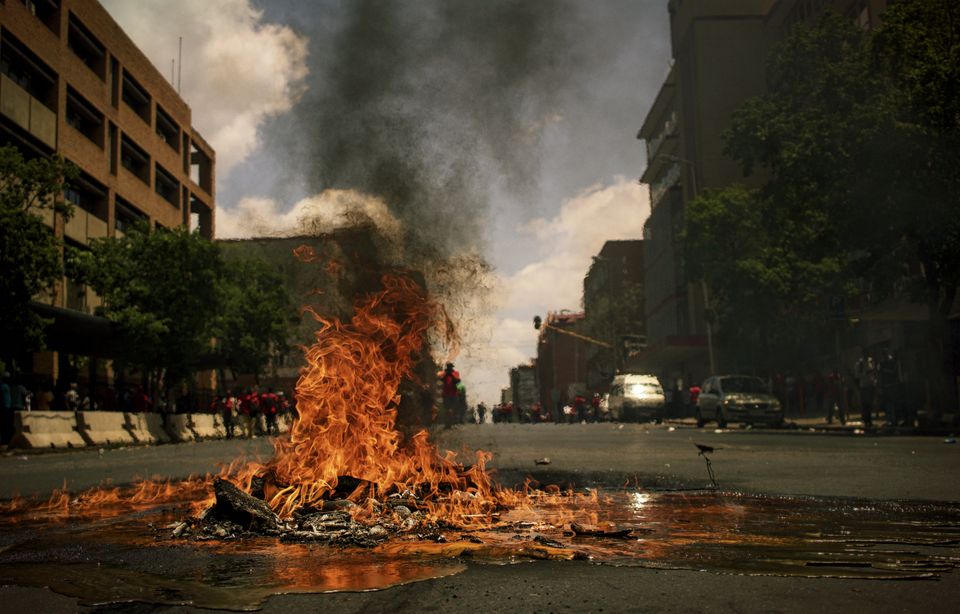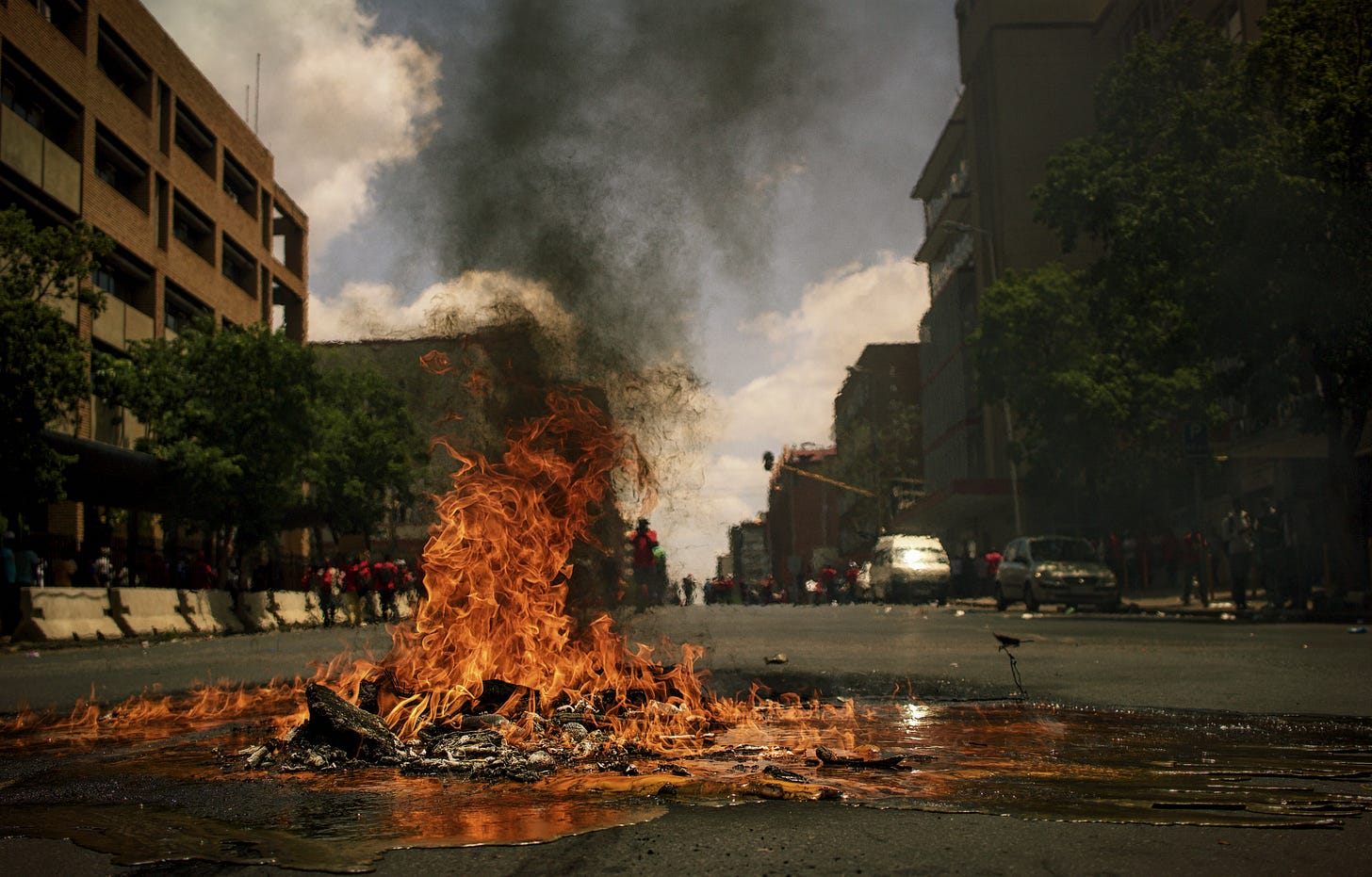This Is the Future Leftist Preppers Want


I’ve been running a long-con on When/If. Using the opening given by 2020, and the wedge of preparedness, I aimed to bring some of you right-of-leftists over to the sustainable side. Preparedness is inherently political; it forces you to choose priorities, to envision a future, to exclude or include. But all conscientious prepping lives on the left, in the center of a three-ring Venn Diagram of Ecology, Anti-Capitalism, and Liberation. Prepping as a leftist means that you recognize these three tenets as the path forward on the planet. Without their advancement and eventual success over greed and racism, we’re going to have a hard row to hoe. But this is where we try to gain some ground, and stop playing defense. I’ll start by breaking down some small actions we can take for each of the three tenets, and of course I’ll wrap this all up with some prepping couched in more immediate concerns.
Ecology
The main worry here is, of course, climate change. Now, short of onkeymay renchingway a fracking site, there’s not a lot that you can do personally to grind global warming to a halt. Eat less (or no) meat, drive less, and don’t fly—that’s gonna help a pinch, but not a lot. Quitting your crypto mining and telling your friends to knock it off will help a pinch, too. What will really help is collective action, whether that be marches, supporting local energy initiatives, or being a constant Resistbot spammer. The real culprits behind climate change are fossil fuel companies, and governments, and they won't respond well to lone picketers.
- Get involved in local climate groups. Protest new fossil fuel infrastructure with them. Put time in for area wetlands and forests. This is number one for a reason: it will take a movement. Become a part of it.
- Don’t ignore city politics. There are bills a city can pass that will allow for collective energy bargaining, which can help switch a huge swath of energy production over from fossil fuels to renewables. These seemingly small fights matter; they're how we claw our way forward in an era reluctant to change, until that era ends—and trust me, we want to make that era end. Working within the system is not how we create an ecologically balanced society—it’s just what we have to work with for now.
- Reach out to your state politicians. Tell them that climate change is an important issue to you and that their actions aren’t cutting it. This is not going to be nearly as effective as steps 1 and 2. No one in the system is receptive to killing the fossil fuel industry.
Anti-Capitalism
I won’t deny that I link you to a lot of stuff to buy—often enough, even, I link to Amazon. That’s not great! I own that. Unfortunately for beginning preppers, most preps are going to involve participating in capitalism. But ultimately, if we’re to have a sustainable future, we have to be able to divest from the capitalist system. While this is unrealistic for most right now, it’s still possible to take steps away from capitalism in our day-to-day life. Some of what we’ve already prepped is anti-capitalist, and there are ideas we can expand upon along those lines.
- Make your own food. Whether that be by gardening, foraging, or raising chickens, this pulls money that would be going to corporate farms and ensures the meat and eggs you consume are obtained far more humanely. Buy from a farmer’s market if you can’t grow your own food—it’s a step in the right direction.
- Learn skills. Carpentry, sewing, blacksmithing, etc. Anything that allows you to unplug yourself from the capitalist marketplace and provide skills for others outside of it.
- Repair instead of replace. Clothes, appliances, tools. This is sustainable in addition to rejecting blind consumerism.
- Trade your time instead of money. Do you need a pair of jeans mended, but can’t sew? Find a friend who can, and offer your time rather than paying—cook a meal, fix a broken bike, what have you. Between skill sharing and gardening, you’re creating a community economic model that values people, relationships, and time over rude profit. Working locally is good for the environment, as well.
Liberation
A sustainable world is one in which everyone is free from systemic oppression. Making that happen means throwing yourself into the causes for which marginalized peoples are fighting. It means giving aid to these groups, lifting their voices over yours, and taking their cue rather than thinking you can step up for them. As I am a white male, this means you and I both need to look beyond my recommendations for this.
- Show up in the streets for racial justice. Of late, this means protesting state violence. Until we dismantle the police state, people of color will continue to bear the brunt of that violence. We have to be there when it's time to protest. Put your bodies between people of color and the police.
- Be a voice for the abolition of the police and carceral state. Defund won’t cut it. Reform does not work. Do not settle when in reality it just means more money for police departments.
- Donate money to bail funds, to defense funds, to the families of victims of police and racial violence. This is, to be clear, almost literally a band-aid fix on the problem, but it’s something most of us can do, even if only with a little money.
- Don’t call the cops. For virtually any reason. Most of the time they will be ineffective at helping you do whatever it is you feel needs done, and the rest of the time they will actively make the situation worse. When that happens, more often than not, it is people of color who will bear that burden—and someone will, no matter what.
Following these three tenets brings us closer to a world that is livable for all, and while we prepare for the worst, we should still strive for something better. This is not something we can do alone; we need everyone in this fight.
Protest Season
We’re not far from warmer weather now, and when that comes we can expect more civil unrest. A lot of protesting was quashed over the winter due to COVID, and that will likely come boiling back whether COVID eases or not. The trial of Derek Chauvin is going to begin soon in Minneapolis, which is bound to increase tensions across the country no matter the verdict. And while all this is percolating, more police violence is inevitable because, say it with me: all cops are bastards.
A long while back, I wrote a little guide on what to pack in your protest bag. It’s high time we dusted those bags off, and resupplied them if necessary. What’s more, the items in that bag are items everyone can use, and that protesters in general need more of. You’ll find mutual aid organizations (or at least street medics) at literally every sizable left-wing protest in the country, and these people could probably stand to get a little help. That’s where you come in. Find your local medics online either here or on social media, to see what you can donate.
We should also learn from the protests of last summer. There were police tactics you’re probably familiar with, but unsure of how to counter, and there are inevitably new issues we will face that we can try to anticipate.
- Kettling: When the police surround a portion or an entire protest with the aim of causing panic and facilitating arrest. To avoid being kettled, keep moving, and avoid small intersections that can be pinched off easily by police forces. If you find yourself marching headlong toward police, make sure you’re not being closed off at the rear.
- Snatch-Vans: Last year we saw an unsettling use of unmarked vehicles for seemingly random abductions and arrests by federal and police forces. Be on the lookout for large, out of state vehicles like vans and SUVs. Do not get caught on the street alone, particularly after a large action. Change out of conventional protest clothes if possible.
Fascists: There will undoubtedly be a far-right presence at protests for the foreseeable future. Whether these people choose to be passive or to act is unknowable, but there are things to look out for, and actions to take in response.
- First, remember that one of the quickest and deadliest ways for an outsider to attack a protest is with a vehicle. Always be on the lookout for vehicles moving at speed, and be aware of nearby impediments that could stop vehicles from reaching you and other protesters.
- Active shooters are another concern. Many fascists will open-carry at protests and more will post up as snipers in the area if they can. When you see someone who appears to sport fascist insignia (anything from a Camp Auschwitz t-shirt to a flag with a flower-print stripe, because this is 2021), alert your friends and the protest organizers if possible. If an active shooting occurs, your best course of action is to stay low and run. It may seem antithetical or irresponsible to leave others behind, but you alive are better able to render aid to the injured than if you are yourself incapacitated. Fighting back is a poor solution unless you are armed, and even then it is not ideal—you will likely be surrounded by police, and further armed aggression, particularly from the left, will be met with a disastrous escalation in force.
Remember that your presence at a protest is not meant to center yourself or your particular cause. You’re (most likely) there to support calls for justice against police violence. It’s not your time to air out grievances, but instead to amplify those voices that that receive so little recognition from the state.
Our purpose, in general and in preparedness, is to move toward a culture that lives sustainably with the Earth, that values people over material wealth, and that breaks down barriers for all. These goals may seem far off, but we can't let their distance deter us from action today. Even small things can add up in the present, and these acts can become part of something much larger in the future.
